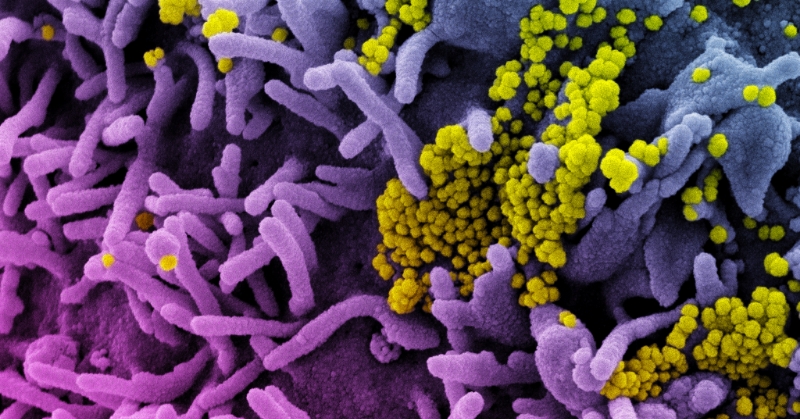Findings by NICHD-led researchers also relevant to other human coronaviruses

Credit: NIAID, NIH
The experimental drug TEMPOL prevents viral replication by targeting the SARS-CoV-2 helicase, in addition to the virus’ replicase, according to a new study led by NIH’s Eunice Kennedy Shriver National Institute of Child Health and Human Development (NICHD). Both enzymes are required for viral replication and spreading infection. The findings expand potential therapies for COVID-19 and other related viruses, including MERS-CoV, which has no approved treatment. The study appears in the Proceedings of the National Academy of Science.
Background
During the pandemic, NICHD researchers in the Rouault Lab discovered that TEMPOL may be a promising antiviral treatment for COVID-19 because it impairs the activity of an enzyme called RNA replicase, which is essential for the virus to replicate. The team showed that the RNA replicase (specifically the enzyme’s nsp12 subunit) requires iron-sulfur clusters for structural support and to function optimally. The same team also tested TEMPOL in a hamster model of COVID-19 and found that the drug was safe and effective.
The researchers continued screening for additional viral proteins that may be similarly dependent on iron-sulfur clusters for optimal function—a feature thought to be rare among viruses.
Results
In the new study, the team focused on another SARS-CoV-2 protein called helicase, or nsp13. Viral helicases are essential for unwinding the RNA strands that serve as blueprints for creating more viral proteins. The researchers found that the zinc-binding domain of the SARS-CoV-2 helicase requires an iron-sulfur cluster to bind and unwind RNA. In the presence of TEMPOL, which degrades iron-sulfur clusters, the helicase became inactive.
Significance
The zinc-binding domain of the SARS-CoV-2 helicase is highly conserved, or nearly identical, across human coronaviruses. Therefore, other coronaviruses that infect humans likely have a similar requirement for iron-sulfur clusters. One example is MERS-CoV, which causes Middle East respiratory syndrome and has no approved treatment. If additional research confirms this feature, TEMPOL could be an effective therapy for MERS-CoV and other coronaviruses.
Reference
Maio N. et al. An iron-sulfur cluster in the zinc-binding domain of the SARS-CoV-2 helicase modulates its RNA binding and unwinding activities. Proceedings of the National Academy of Science DOI: 10.1073/pnas.2303860120 (2023)

 BACK TO TOP
BACK TO TOP